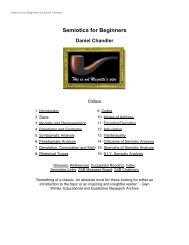Semiotics for Beginners by Daniel Chandler
Semiotics for Beginners by Daniel Chandler
Semiotics for Beginners by Daniel Chandler
You also want an ePaper? Increase the reach of your titles
YUMPU automatically turns print PDFs into web optimized ePapers that Google loves.
<strong>Semiotics</strong> <strong>for</strong> <strong>Beginners</strong> <strong>by</strong> <strong>Daniel</strong> <strong>Chandler</strong><br />
• Empty signifier: An 'empty' or 'floating' signifier is variously defined as a signifier with a vague, highly variable,<br />
unspecifiable or non-existent signified. Such signifiers mean different things to different people: they may stand<br />
<strong>for</strong> many or even any signifieds; they may mean whatever their interpreters want them to mean. Those who posit<br />
the existence of such signifiers argue that there is a radical disconnection between signifier and signified. For a<br />
Saussurean semiotician no signifier can exist without a corresponding signified - to qualify as a sign something<br />
must be signified. See also: Signifier, Simulacrum, Transcendent signified<br />
• Encoding: The production of texts <strong>by</strong> encoders with reference to relevant codes (Jakobson). Encoding involves<br />
<strong>for</strong>egrounding some meanings and backgrounding others. See also: Codes, Decoding, Encoding and decoding<br />
model of communication<br />
• Encoding and decoding model of communication: Following Jakobson's model of interpersonal communication<br />
which moved beyond the basic transmission model of communication Stuart Hall proposed a model of mass<br />
communication which underlined the importance of active interpretation within relevant codes and a social<br />
context. See also: Codes, Circuit of communication, Decoding, Encoding, Transmission models of communication<br />
• Enunciation/énonciation: In some contexts, an énoncé is an utterance and énonciation is the act of uttering it. In<br />
his model, Saussure chose to ignore the circumstances of enunciation (see Langue and parole). In structural<br />
linguistic theory, enunciation refers specifically to the aspect of an utterance which addresses and positions its<br />
'receivers'. In film theory, Benveniste's distinction between 'the speaking subject' and 'the subject of speech' have<br />
been treated as analogous to a distinction between production factors (the 'level of enunciation') and narrative<br />
('the level of fiction'). In 'realist' texts the act of enunciation is backgrounded: <strong>for</strong> instance, Metz argued that<br />
(realist) cinematic modes of address mask their own enunciation, implying no addresser or addressee. See also:<br />
Addresser and addressee, Functions of signs, Modes of address, Narration or narrative voice, Realism, aesthetic<br />
• Episteme: Foucault uses the term épistème to refer to the total set of relations within a particular historical period<br />
uniting the discursive practices which generate its epistemologies. See also: Discourse, Interpretative community<br />
• Epistemic community: See Interpretative community<br />
• Epistemology: A branch of philosophy concerned with the theory of knowledge. The term refers to how 'the world'<br />
can be known and what can be known about it. Realism, idealism and constructivism are all epistemological<br />
stances regarding what is 'real'. Epistemologies embody ontological assumptions. Thomas Kuhn referred to<br />
'epistemic' (epistemological) communities which were characterized <strong>by</strong> shared texts, interpretations and beliefs.<br />
See also: Constructivism, Correspondence theory of truth, Idealism, Ontology, Realism (objectivism), Relativism,<br />
epistemological<br />
• Erasure, writing under: Derrida adopted from Heidegger the strategy of writing 'sous rature' which involved<br />
printing a word with crossed lines through it, leaving the original word legible, thus: Being. This was intended to<br />
indicate that although the term was deeply problematic it was still necessary to use it. It alludes to the issue of<br />
linguistic determinism. See also: Deconstruction, Linguistic determinism<br />
• Essentialism: Essentialists argue that certain signifieds are distinct, autonomous entities which have an objective<br />
existence and essential properties and which are definable in terms of some kind of absolute, universal and<br />
transhistorical 'essence'. These signifieds (such as 'Reality', 'Truth', 'Meaning', 'Facts', 'Mind', 'Consciousness',<br />
'Nature', 'Beauty', 'Justice', 'Freedom') are granted an ontological status in which they exist 'prior to' language . In<br />
relation to people, the term refers to the stance that human beings (or a specified category of people, such as<br />
'women') have an inherent, unchanging and distinctive nature which can be 'discovered' (to say this of women or<br />
men, <strong>for</strong> instance, is biological essentialism). The stance known as 'humanism' (which is deeply embedded in<br />
Western culture) is essentialist, based on the assumption that the individual has an 'inner self' ('personality',<br />
'attitudes' and 'opinions') which is stable, coherent, consistent, unified and autonomous and which determines our<br />
behaviour. Bourgeois ideology is essentialist in characterizing society in terms of 'free' individuals whose pregiven<br />
essences include 'talent', 'efficiency', 'laziness' or 'profligacy'. Anti-essentialists such as relativists and<br />
structuralist and poststructuralist semioticians deny that things have essential properties which are independent of<br />
our ways of defining and classifing them - they emphasize the contingency of signifieds (social semioticians note<br />
in particular the socio-cultural and historical processes involved). For constructivists many signifieds which<br />
'commonsense' regards as having essential properties are socially constructed. 'Nature vs. Nurture' debates<br />
reflect essentialist vs. constructionist positions. Essentialism is a <strong>for</strong>m of idealism. Materialism is an antiessentialist<br />
position which counters essentialist abstraction and reification with a focus on the material conditions<br />
of lived existence. See also: Constructivism, Idealism, Materialism, Nomenclaturism, Priorism, Realism<br />
(objectivism), Reductionism, Reification, Relativism, epistemological, Transcendent(al) signified<br />
• Estrangement: See Denaturalization<br />
• Expression, plane of: See Plane of expression




